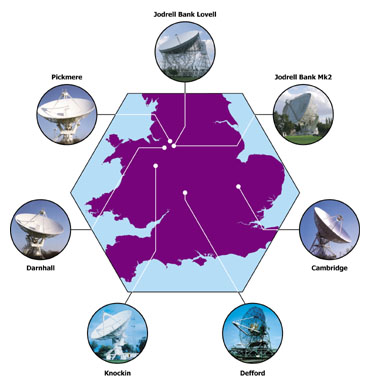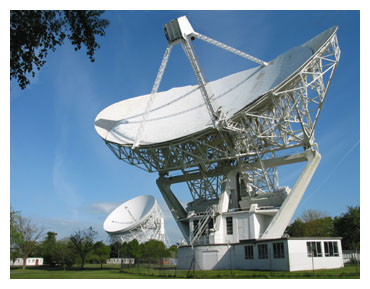The future funding of e-MERLIN and Jodrell Bank
Reports of advisory panels published
13 June 2008

The MERLIN array of radio telescopes - the UK's national radio astronomy facility. Credit: Jodrell Bank Observatory (University of Manchester).

The Lovell and Mark II Telescopes at Jodrell Bank Observatory working together as part of MERLIN. Credit: Jodrell Bank Observatory (University of Manchester).
The e-MERLIN project, due for completion in 2009, has received a glowing report from a panel of senior astronomers who say "it is guaranteed to lead to major discoveries" and "e-MERLIN could be a world-leading facility well into the next decade".
The panel was set up by the Government's Science & Technology Facilities Council (STFC) to advise on the review of its programme conducted by their Particle Physics, Astronomy and Nuclear Physics science committee (PPAN). PPAN's initial recommendations had placed e-MERLIN in their "low priority" category, which led to widespread concern over the future of e-MERLIN and Jodrell Bank .
Following this announcement, a period of consultation with the research community was held. Several panels of senior scientists were specially convened to review more than 1200 submissions to the consultation and make recommendations to STFC. The e-MERLIN/VLBI national radio astronomy facility operated from the University of Manchester's Jodrell Bank Observatory came under the remit of the ground-based astronomy panel.
The reports from these advisory panels and the response of PPAN to these reports have now been published by STFC.
We very much welcome the comments of the ground-based astronomy panel. Their recommendation is:
"The panel agreed that e-MERLIN offered dramatic potential to both traditional UK radio astronomy users and importantly to our broader community. Even accounting for the competition (e.g. e-VLA) e-MERLIN could be a world-leading facility well into the next decade. The proposed legacy programmes demonstrate the great breadth of science which will be opened up by this new facility."
We have now received formal letters of intent for these legacy programmes involving over 300 scientists from around the world and covering projects from the formation of planets to the early evolution of galaxies.
The advisory panel was also alarmed by suggestions that the UK withdraw from its involvement in the European radio astronomy networks (JIVE/EVN), a decision which they recognise would seriously damage the UK's international standing in radio astronomy.
They conclude that e-MERLIN/JIVE should be moved from the lowest priority band, as originally proposed by PPAN, to the second highest.
Despite these strong recommendations, PPAN have now placed e-MERLIN/JIVE in the second lowest category of their new priority list. However, they have stated that all projects in this category and above could be funded within their current financial constraints.
A decision on which projects are funded will be deferred until after a meeting of the STFC Council on July 1st.
More information
The advisory panel reports and PPAN's response can be found on this STFC webpage.
For more information on e-MERLIN and its capabilities see the e-MERLIN project webpage.
The STFC consultation and Programmatic Review is described on this STFC webpage.
For a summary of media coverage of this story see our "in the news" webpage.
For more information on the wider STFC funding issues see Paul Crowther's webpage.


